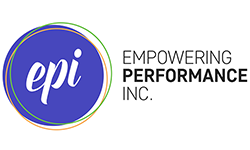Conflict Is an Opportunity for Growth
Conflict is an unavoidable part of our lives and part of what makes us human. But many would rather run in the opposite direction than confront it. However, dodging tension to create the appearance of harmony is problematic. Avoiding conflict altogether creates silos and internal angst among employees and teams, affecting work culture and drastically impacting productivity. One study found U.S. employees spend 2.8 hours of weekly worktime just dealing with conflict!
Conflict is not inherently negative. It’s an inevitable and normal aspect of human interaction. So, while it can be daunting to take on, conflict is always an opportunity for growth!
But it does take work to overcome. And it starts with personal responsibility and modeling above-the-line behavior.
Personal responsibility is about seeing a situation for what it is, owning your part, identifying possibilities for improvement, and taking action. Personal responsibility is also called “above-the-line” thinking and action. This concept was first introduced in 1994 by authors and management consultants, Roger Connors and Tom Smith, in their book The Oz Principle. (Connors and Smith have kept their research updated and the book remains an invaluable resource for personal and organizational accountability.)
“Above-the-line” thinking means refraining from saying, “It’s not my job,” finger-pointing, or “covering your tail.” When you think and act above-the-line, you:
“See It.” Acknowledge you’re accountable to See It by proactively asking for the perspective and feedback of others. Be open and honest in your communication. Truly hear the “hard things” to see the situation as it actually is.
“Own It.” You Own It by being personally invested, acknowledging your involvement, thereby creating and maintaining a sense of alignment. You own both yours and the team’s objectives.
“Solve It.” Make yourself accountable to Solve It by constantly asking yourself what else you can do to achieve the desired results or change the undesired ones, while creatively dealing with obstacles.
“Do It.” Behave in a way that proves your accountability to Do It and report proactively. Relentlessly follow up. You do what you say you’ll do and measure your own progress.
Above-the-line thinking and actions not only help resolve conflict situations, they also model to your team how to effectively resolve conflict among themselves. And this can lead to progress and recommitment! Need some guidance in this area? We’d love to help!
Michelle Kelly, CEO (Chief Enjoyment Officer)



